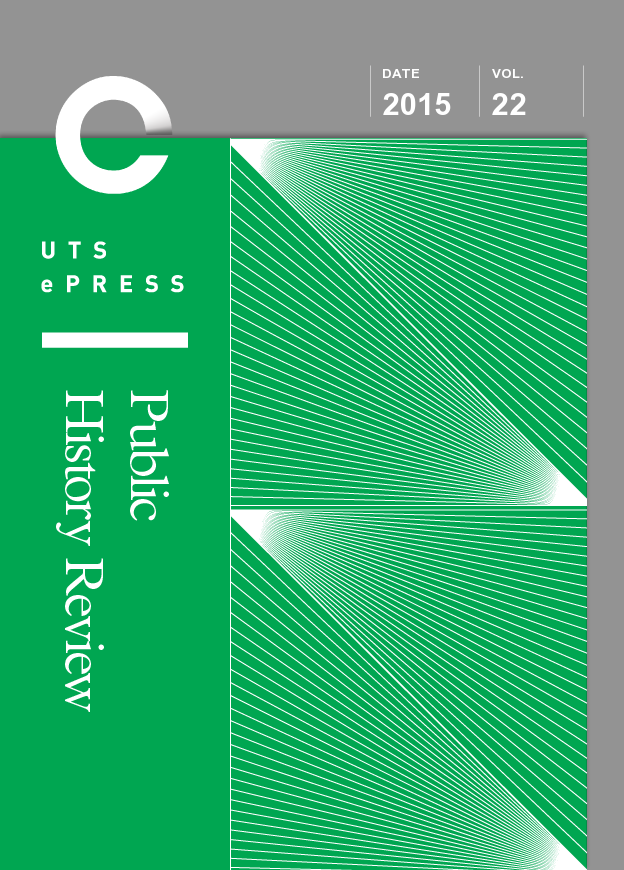Confederate Immigration to Brazil: A Cross-Cultural Approach to Reconstruction and Public History
Main Article Content
Abstract
Article Details
Issue
Section
Authors who submit articles to this journal from 31st March 2014 for publication, agree to the following terms:
a) Authors retain copyright and grant the journal right of first publication with the work simultaneously licensed under a Creative Commons Attribution License that allows others to share and adapt the work with an acknowledgement of the work's authorship and initial publication in this journal.
b) Authors are able to enter into separate, additional contractual arrangements for the non-exclusive distribution of the journal's published version of the work (e.g., post it to an institutional repository or publish it in a book), with an acknowledgement of its initial publication in this journal.
c) Authors are permitted and encouraged to post their work online (e.g., in institutional repositories or on their website) prior to and during the submission process, as it can lead to productive exchanges, as well as earlier and greater citation of published work (See The Open Access Citation Advantage Service). Where authors include such a work in an institutional repository or on their website (ie. a copy of a work which has been published in a UTS ePRESS journal, or a pre-print or post-print version of that work), we request that they include a statement that acknowledges the UTS ePRESS publication including the name of the journal, the volume number and a web-link to the journal item.
d) Authors should be aware that the Creative Commons Attribution (CC-BY) License permits readers to share (copy and redistribute the work in any medium or format) and adapt (remix, transform, and build upon the work) for any purpose, even commercially, provided they also give appropriate credit to the work, provide a link to the license, and indicate if changes were made. They may do these things in any reasonable manner, but not in any way that suggests you or your publisher endorses their use.
For Vol 20 (2013) and before, the following copyright applied:
Authors submitting articles to UTSePress publications agree to assign a limited license to UTSePress if and when the manuscript is accepted for publication. This license allows UTSePress to publish a manuscript in a given issue. Articles published by UTSePress are protected by copyright which is retained by the authors who assert their moral rights. Authors control translation and reproduction rights to their works published by UTSePress. UTSePress publications are copyright and all rights are reserved worldwide. Downloads of specific portions of them are permitted for personal use only, not for commercial use or resale. Permissions to reprint or use any materials should be directed to UTSePress.
References
ABBORINO, R. H. Among Descedents of Civil War Refugees… Spirit of the Old Dixie Still Lives in Brazil, Centro de Memoria, National Enquire.
Berlin, I. 2005. Generations of Captivity: A History of African American Slaves, Cambridge and London, The Belknap Press of Harvard University Press.
Blumenthal, H. 1970. France and the United States: Their Diplomatic Relations, 1789-1914, Chapel Hill, The University of North Carolina Press.
Bodnar, J. 1992. Remaking America: Public Memory Commemoration, and Patriotism in the Twentieth Century, Princeton NJ, Princeton University Press.
Bonner, R. E. 2009. Mastering America: Southern Slaveholders and the Crisis of American Nationhood, New York, Cambridge University Press.
Cook, R. J. 2007. Troubled Commemoration: The American Civil War Centennial, 1961-1965, Baton Rouge, Louisiana State University Press.
FIFIELD, A. 2015. Japan's Leader Stops Short of World War II Apology. Washington Post [Online]. Available: https://www.washingtonpost.com/world/abe-offers-condolences-as-anniversaryof-world-war-ii-surrender-nears/2015/08/14/30489c66-4030-11e5-b2c4-af4c6183b8b4_story.html [Accessed 15 October 2015].
Harter, E. C. 2000. The Lost Colony of the Confederacy, Texas A&M University Press.
Jones, J. M. 1967. Soldado Descansa, Uma Epopeia Norte Americana sob os Ceus do Brasil, The Fraternidade Descendencia Americana.
Jr, L. A. P. 1998. The War of 1898: The United States & Cuba in History and Historiography, Chapel Hill and London, The University of North Carolina Press.
Kammen, M. 1991. Mystic Chords of Memory: The Transformation of Tradition in American Culture, New York, Vintage Books.
LAC, J. F. D. 2015. Sincere Condolences": Full Text of Shinzo Abe's Statement on World War II. Washington Post [Online]. Available: https://www.washingtonpost.com/news/worldviews/wp/2015/08/14/sincerecondolences-full-text-of-shinzo-abes-statement-on-world-war-ii [Accessed 15 October 2015].
LEE, H. 1966. Descendents of the Confederate emigrants Still Maintain a Society in Brazil But it's Being Assimilated. The Washington Post, 20 March.
